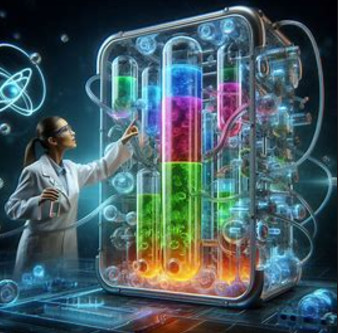Fuel cell technology is a promising clean energy solution that converts chemical energy into electrical energy through a chemical reaction. It offers several advantages over traditional combustion-based technologies:
How Fuel Cells Work:
- Fuel and Oxidant: Hydrogen gas (fuel) and oxygen (oxidant) are supplied to the fuel cell.
- Electrodes: The fuel and oxidant are fed to the anode and cathode, respectively.
- Electrolyte: An electrolyte, a substance that conducts ions, separates the two electrodes.
- Chemical Reaction: At the anode, hydrogen molecules split into protons and electrons. The protons pass through the electrolyte to the cathode, while the electrons travel through an external circuit, generating electricity.
- Water Formation: At the cathode, the protons, electrons, and oxygen combine to form water as a byproduct.

Types of Fuel Cells:
Different types of fuel cells are classified based on the electrolyte used:
- Proton Exchange Membrane (PEM) Fuel Cells: Use a polymer membrane as the electrolyte. They operate at relatively low temperatures and are suitable for transportation applications like fuel cell vehicles.
- Solid Oxide Fuel Cells (SOFCs): Employ a solid ceramic material as the electrolyte. They operate at high temperatures and are efficient for stationary power generation.
- Alkaline Fuel Cells (AFCs): https://fuelcellz.com/solid-oxide-fuel-cells-sofc/Utilize a potassium hydroxide solution as the electrolyte. They have high efficiency but are sensitive to carbon dioxide, limiting their applications.
- Phosphoric Acid Fuel Cells (PAFCs): Use phosphoric acid as the electrolyte. They are durable and reliable but have lower efficiency compared to other types.
- Molten Carbonate Fuel Cells (MCFCs): Employ molten carbonate salts as the electrolyte. They operate at high temperatures and can use various fuels, including natural gas.
Advantages of Fuel Cell Technology:
- High Efficiency: Fuel cells can convert fuel directly into electricity with high efficiency, reducing energy waste.
- Low Emissions: Hydrogen fuel cells produce only water vapor as a byproduct, making them environmentally friendly.
- Modular Design: Fuel cells can be scaled to various sizes, making them suitable for different applications.
- Quiet Operation: Fuel cells operate silently, reducing noise pollution.
- Fuel Flexibility: Some types of fuel cells can use various fuels, including hydrogen, natural gas, and biofuels.
Challenges and Future Directions:
- Hydrogen Storage and Distribution: Developing efficient and safe methods for storing and transporting hydrogen is crucial.
- Cost Reduction: Lowering the cost of fuel cell systems is essential for widespread adoption.
- Durability and Reliability: Improving the durability and reliability of fuel cells is necessary for long-term operation.
- Fuel Cell Infrastructure: Building a robust infrastructure for hydrogen fueling stations is essential for transportation applications.
Fuel cell technology holds significant potential to contribute to a cleaner and more sustainable energy future. Ongoing research and development efforts are focused on addressing the challenges and further advancing this promising technology.
